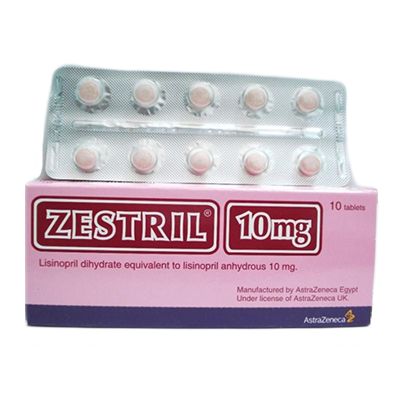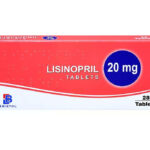What Does Lisinopril Look Like?

Lisinopril is in a class of medications called angiotensin-converting enzyme (ACE) inhibitors. It works by decreasing certain chemicals that tighten the blood vessels, so blood flows more smoothly and the heart can pump blood more efficiently.
Lisinopril is used alone or in combination with other medications to treat high blood pressure in adults and children 6 years of age and older. It is used in combination with other medications to treat heart failure. Lisinopril is also used to improve survival after a heart attack.
High blood pressure is a common condition and when not treated, can cause damage to the brain, heart, blood vessels, kidneys, and other parts of the body. Damage to these organs may cause heart disease, heart attack, heart failure, stroke, kidney failure, loss of vision, and other problems. In addition to taking medication, making lifestyle changes will also help to control your blood pressure. These changes include eating a diet that is low in fat and salt, maintaining a healthy weight, exercising at least 30 minutes most days, not smoking, and using alcohol in moderation.
How long does it take lisinopril to take effect?
Lisinopril starts to work within a few hours to reduce high blood pressure, but it may take a few weeks for it to take full effect. If you’re taking lisinopril for heart failure, it may take weeks, even months, before you feel better.
What Does Lisinopril Look Like?
Lisinopril comes as a tablet and a solution (liquid) to take by mouth. Lisinopril comes in the following forms: 5 mg, 10 mg, 20 mg. The most common brands are Prinivil and Zestril other brands are :
| Product | Company |
| Odace-10mg Tab | Zydus Cadila |
| Nivant-10mg Tab | Zydus Cadila |
| Cipril 10 Mg Tablet | Cipla |
| Lisoril 10mg Tab | Ipca Labs |
| Hipril-10mg Tab | Micro Labs |
| Lipril 10mg Tablet 15s | Lupin |
| Listril-10mg Tab | Torrent Pharma |
| Zestril-10mg Tablet 15s | ASTRA ZENECA |
How should I use this medication?
The recommended adult dose of lisinopril ranges from 2.5 mg to 40 mg daily, depending on the condition being treated. It is taken in one daily dose with or without food.
People who take other medications that lower blood pressure (e.g., diuretics) or people who have kidney disease may need lower doses. It may take up to 2 weeks to see the full effects of the medication.
The dose of lisinopril for children is determined by the child’s body weight. Children who weigh 20 to 50 kilograms should start with 2.5 mg once daily. This may be gradually increased to a daily dose of 20 mg. Children who weigh more than 50 kilograms should start with 5 mg taken once daily. This may be gradually increased to a daily dose of 40 mg.
Many things can affect the dose of medication that a person needs, such as body weight, other medical conditions, and other medications. If your doctor has recommended a dose different from the ones listed here, do not change the way that you are taking the medication without consulting your doctor.
It is important to take this medication exactly as prescribed by your doctor. If you miss a dose, skip the missed dose and continue with your regular dosing schedule. Do not take a double dose to make up for a missed one. If you are not sure what to do after missing a dose, contact your doctor or pharmacist for advice.
Who should NOT take this medication?
Do not take lisinopril if you:
- are allergic to lisinopril or any ingredients of the medication
- are allergic to another ACE inhibitor (e.g., captopril, enalapril, quinapril, ramipril)
- are pregnant or intend to become pregnant
- are breastfeeding
- are taking aliskiren and have:
- diabetes with heart, eye, or other end-organ damage
- decreased kidney function
- high levels of potassium in the blood
- congestive heart failure with low blood pressure
- are taking the medication sacubitril/valsartan
- are taking a medication in the class of angiotensin receptor blockers (e.g., irbesartan, losartan, valsartan) or another angiotensin converting enzyme inhibitor (e.g., captopril, lisinopril, ramipril) and have:
- diabetes with kidney damage
- decreased kidney function
- high levels of potassium in the blood
- congestive heart failure with low blood pressure
- have a history of angioedema (a serious allergic reaction that causes the area around the throat and tongue to swell) after taking any ACE inhibitors (e.g., captopril, enalapril, fosinopril, ramipril)
- have been diagnosed with hereditary angioedema
- have severely decreased kidney function and are between 6 and 16 years of age
Do not give this medication to children younger than 6 years of age.
What side effects are possible with this medication?
Many medications can cause side effects. A side effect is an unwanted response to a medication when it is taken in normal doses. Side effects can be mild or severe, temporary or permanent.
The side effects listed below are not experienced by everyone who takes this medication. If you are concerned about side effects, discuss the risks and benefits of this medication with your doctor.
The following side effects have been reported by at least 1% of people taking this medication. Many of these side effects can be managed, and some may go away on their own over time.
Contact your doctor if you experience these side effects and they are severe or bothersome. Your pharmacist may be able to advise you on managing side effects.
- abdominal pain
- changes to sexual performance
- cough (dry, persistent)
- diarrhea
- drowsiness
- dry mouth
- mild dizziness
- hair loss
- headache
- heartburn
- nausea
- runny nose
- signs of low blood pressure (e.g., dizziness or lightheadedness)
- skin rash
- stomach pain
- strange dreams
- taste changes
- trouble sleeping
- unusual tiredness/fatigue
- vomiting
- weakness
Although most of these side effects listed below don’t happen very often, they could lead to serious problems if you do not seek medical attention.
Check with your doctor as soon as possible if any of the following side effects occur:
- chest pain
- confusion
- hallucinations (seeing or hearing things that aren’t there)
- increased frequency of infections or flu-like symptoms
- itching
- numbness or tingling in the fingers or toes
- rapid heartbeat
- signs of anemia (low red blood cells; e.g., dizziness, pale skin, unusual tiredness or weakness, shortness of breath)
- signs of clotting problems (e.g., unusual nosebleeds, bruising, blood in urine, coughing blood, bleeding gums, cuts that don’t stop bleeding)
- signs of depression (e.g., poor concentration, changes in weight, changes in sleep, decreased interest in activities, thoughts of suicide)
- signs of electrolyte disturbances (e.g., weakness, drowsiness, muscle pain or cramps, irregular heart beat)
- signs of kidney problems (e.g., decreased urine production, blood in the urine, swelling, fatigue, abdominal pain)
- signs of liver problems (e.g., nausea, vomiting, diarrhea, loss of appetite, weight loss, yellowing of the skin or whites of the eyes, dark urine, pale stools)
- signs of too much potassium in the body (e.g., confusion; irregular heartbeat; nervousness; numbness or tingling in hands, feet, or lips; shortness of breath or difficulty breathing; weakness or heaviness of legs)
- symptoms of psoriasis (e.g., red, itchy, scaly patches on knees, elbows, trunk, and scalp)
- wheezing
Stop taking the medication and seek immediate medical attention if any of the following occur:
- signs of angioedema (e.g., swelling of face, mouth, hands, or feet)
- signs of pancreatitis (e.g., abdominal pain on the upper left side, back pain, nausea, fever, chills, rapid heartbeat, swollen abdomen)
- signs of a severe skin reaction such as blistering, peeling, a rash covering a large area of the body, a rash that spreads quickly, or a rash combined with fever or discomfort
- trouble in swallowing or breathing (sudden)
Some people may experience side effects other than those listed. Check with your doctor if you notice any symptom that worries you while you are taking this medication.
Lisinopril Safety Information
Before you begin using a medication, be sure to inform your doctor of any medical conditions or allergies you may have, any medications you are taking, whether you are pregnant or breast-feeding, and any other significant facts about your health. These factors may affect how you should use this medication.
Angioedema: Angioedema (a serious allergic reaction that causes the area around the throat and tongue to swell) may occur with the use of lisinopril. If you experience swelling of the face, tongue, or throat, stop taking lisinopril at once and get immediate medical attention. Other medications in the class of medications known as ACE inhibitors should not be taken in the future. People who have had angioedema caused by other substances may be at increased risk of angioedema while receiving an ACE inhibitor.
Blood disorders: In rare cases, a low white blood cell count has been reported with people taking this medication. Your doctor may occasionally monitor your level of white blood cells by performing blood tests. Low white blood cell levels may increase your risk for infection. If you notice any signs of infection (e.g., fever, sore throat), contact your doctor as soon as possible.
Cough: People taking lisinopril may develop a dry, persistent cough that usually disappears only after stopping or lowering the lisinopril dose. Be sure to tell your doctor about any cough that does not seem to be related to a usual cause.
Diabetes: ACE inhibitors such as lisinopril may lead to hypoglycemia (low blood sugar levels) for people with diabetes. If you have diabetes, discuss with your doctor how this medication may affect your medical condition, how your medical condition may affect the dosing and effectiveness of this medication, and whether any special monitoring is needed.
Kidney function: Changes in kidney function have been seen for certain people (e.g., people with narrowed blood vessels in their kidneys, or those with severe congestive heart failure). The use of diuretics (water pills), nonsteroidal anti-inflammatory drugs (NSAIDs), or aliskiren may further increase risk of kidney problems for people already at risk for this problem. If you have reduced kidney function or kidney disease, including narrowing of the blood vessels in the kidneys, discuss with your doctor how this medication may affect your medical condition, how your medical condition may affect the dosing and effectiveness of this medication, and whether any special monitoring is needed. If you have reduced kidney function, you may require lower doses of this medication.
Liver function: Lisinopril may reduce liver function and can cause liver failure. If you experience symptoms of liver problems such as fatigue, feeling unwell, loss of appetite, nausea, yellowing of the skin or whites of the eyes, dark urine, pale stools, abdominal pain or swelling, and itchy skin, contact your doctor immediately.
If you have liver problems, discuss with your doctor how this medication may affect your medical condition, how your medical condition may affect the dosing and effectiveness of this medication, and whether any special monitoring is needed. Your doctor may want to test your liver function regularly with blood tests while you are taking this medication.
Low blood pressure: Occasionally, blood pressure drops too low after taking lisinopril. This usually happens after the first or second dose or when the dose is increased. It is more likely to occur for those who take water pills or the medication aliskiren, have a salt-restricted diet, are on dialysis, are suffering from diarrhea or vomiting, or have been sweating excessively and not drinking enough liquids. If low blood pressure causes you to faint or feel lightheaded, contact your doctor.
To reduce the risk of dizziness, get up slowly from a lying or sitting position. If low blood pressure causes you to faint or feel lightheaded, contact your doctor.
Potassium levels: Increases in blood levels of potassium occur for some people who take this medication. This rarely causes problems, but your doctor will likely want to monitor your potassium levels through blood tests. Avoid using salt substitutes that contain potassium while you are taking lisinopril.
Reduced alertness: Lisinopril may cause drowsiness or dizziness, especially at the beginning of treatment or after a dose increase. This can affect your ability to drive or operate machinery. Avoid these and other hazardous tasks until you have determined how this medication affects you.
Surgery: It is important that your physician and anesthesiologist know that you are taking this medication before you undergo any surgical procedures requiring general anesthesia.
Pregnancy: ACE inhibitors such as lisinopril may cause severe harm or death to the developing baby if taken by the mother during pregnancy.
This medication should not be used during pregnancy. If you become pregnant while taking this medication, stop taking lisinopril immediately and contact your doctor.
Breast-feeding: This medication passes into breast milk. If you are a breast-feeding mother and are taking lisinopril, it may affect your baby. Talk to your doctor about whether you should continue breast-feeding.
Children: The safety and effectiveness of lisinopril for children less than 6 years of age have not been established. Lisinopril is not recommended for this age group. This medication may be used by children more than 6 years old to reduce blood pressure.





